
Czechoslovakia was a landlocked country in Central Europe, created in 1918, when it declared its independence from Austria-Hungary. In 1938, after the Munich Agreement, the Sudetenland became part of Nazi Germany, while the country lost further territories to Hungary and Poland. Between 1939 and 1945, the state ceased to exist, as Slovakia proclaimed its independence and Carpathian Ruthenia became part of Hungary, while the German Protectorate of Bohemia and Moravia was proclaimed in the remainder of the Czech Lands. In 1939, after the outbreak of World War II, former Czechoslovak President Edvard Beneš formed a government-in-exile and sought recognition from the Allies.
Politics of Slovakia takes place in a framework of a parliamentary representative democratic republic, with a multi-party system. Legislative power is vested in the parliament and it can be exercised in some cases also by the government or directly by citizens.
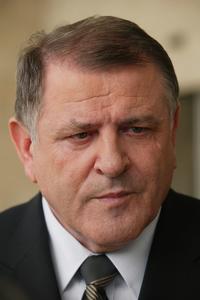
Vladimír Mečiar is a Slovak former politician who served as the prime minister of Slovakia from June 1990 to May 1991, June 1992 to March 1994, and again from December 1994 to October 1998. He was the leader of the Movement for a Democratic Slovakia (HZDS), a populist party in Slovakia.
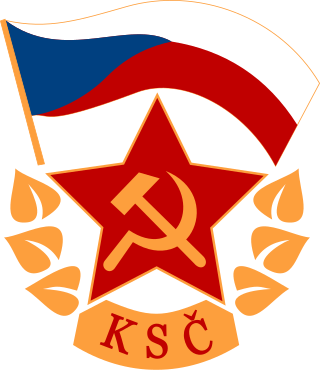
The Communist Party of Czechoslovakia was a communist and Marxist–Leninist political party in Czechoslovakia that existed between 1921 and 1992. It was a member of the Comintern. Between 1929 and 1953, it was led by Klement Gottwald. The KSČ was the sole governing party in the Czechoslovak Socialist Republic though it was a leading party along with the Slovak branch and four other legally permitted non-communist parties. After its election victory in 1946, it seized power in the 1948 Czechoslovak coup d'état and established a one-party state allied with the Soviet Union. Nationalization of virtually all private enterprises followed, and a command economy was implemented.
The government of Czechoslovakia under Marxism–Leninism was in theory a dictatorship of the proletariat. In practice, it was a one-party dictatorship run by the Communist Party of Czechoslovakia, the KSC.

The Slovak Democratic and Christian Union – Democratic Party is a liberal-conservative, Christian-democratic political party in Slovakia. The SDKÚ-DS was a member of the Centrist Democrat International and was a member of the European People's Party until 2018, when it was expelled due to inactivity.

Direction – Social Democracy, also commonly referred to as Smer, is a left-wing nationalist and left-wing populist political party in Slovakia led by the incumbent prime minister Robert Fico. The party identifies as social-democratic, and was described as a combination of "leftist economics and nationalist appeal".

The National Council of the Slovak Republic is the national parliament of Slovakia. It is unicameral and consists of 150 members, who are elected by universal suffrage under proportional representation with seats distributed via largest remainder method with Hagenbach-Bischoff quota every four years.

The president of the Slovak Republic serves as the head of state of Slovakia and commander-in-chief of the Armed Forces. The people directly elect the president for five years, for a maximum of two consecutive terms. The presidency is essentially a ceremonial office, but the president exercises certain limited powers with absolute discretion. Their official residence is the Grassalkovich Palace in Bratislava.
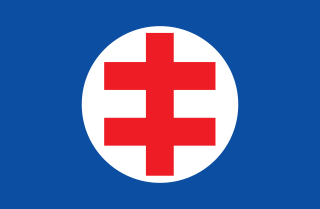
Hlinka's Slovak People's Party, also known as the Slovak People's Party or the Hlinka Party, was a far-right clerico-fascist political party with a strong Catholic fundamentalist and authoritarian ideology. Its members were often called ľudáci.

The Civic Conservative Party is a centre-right liberal conservative political party in Slovakia. It has one seat in the National Council, following the 2023 election. It has also representation at regional and local level.
There are five types of elections in Slovakia: municipal elections, regional elections, parliamentary elections, presidential elections and elections to the European Parliament. All four types of elections are normally held after fixed periods, although early elections can occur in certain situations. Elections are conventionally scheduled for a Saturday - the polls normally open at 7:00 in the morning and close at 22:00 in the evening. Citizens aged 18 years or older are eligible to vote. Those serving prison sentences for particularly serious crimes, as well as those deprived of legal capacity, including persons with mental disabilities, are denied the right to vote. Voter registration is passive and decentralized with the voter register maintained by municipalities based on the permanent residence register. Voter lists are updated continuously based on municipal records and input provided by state institutions or other municipalities. Voters may verify their data in voter lists, and, if necessary, request correction until the day before election day. On election day, a voter can be added to a voter list upon presenting an identity card with proof of residency. Some 4.4 million voters are registered and valid to vote in the elections. Voters are only able to vote from abroad during the Parliamentary Elections in Slovakia.

The Czechoslovak Socialist Republic, known from 1948 to 1960 as the Czechoslovak Republic, Fourth Czechoslovak Republic, or simply Czechoslovakia, was the Czechoslovak state from 1948 until 1989, when the country was under communist rule, and was regarded as a satellite state in the Soviet sphere of interest.
The Green Party, between October 1991 and January 2006 called the Green Party in Slovakia, was an environmentalist political party in Slovakia without parliamentary representation.

Most–Híd 2023 is an inter-ethnic political party in Slovakia. Its programme calls for greater cooperation between the country's Hungarian minority and ethnic Slovak majority. It was one of four parties in the Fico III government coalition, but lost all its seats in the National Council in the 2020 Slovak parliamentary election.

Parliamentary elections were held in Slovakia on 10 March 2012 to elect the 150 members of the National Council. The elections followed the fall of Prime Minister Iveta Radičová's Slovak Democratic and Christian Union – Democratic Party-led coalition in October 2011 over a no confidence vote her government had lost because of its support for the European Financial Stability Fund. Amidst a major corruption scandal involving local center-right politicians, former Prime Minister Robert Fico's Direction – Social Democracy won an absolute majority of seats.

Parliamentary elections were held in Slovakia on 5 March 2016 to elect the 150 members of the National Council. The ruling left-wing populist Direction – Social Democracy (Smer) party remained the strongest party, but lost its majority. The Slovak Democratic and Christian Union – Democratic Party (SDKÚ–DS), which led the government between 2000–06 and 2010–12, was defeated heavily, failing to cross the electoral threshold and losing its representation in the National Council. The centre-right Christian Democratic Movement (KDH) also failed to cross the threshold for the first time since 1990, whilst the far-right nationalist Kotleba – People's Party Our Slovakia (ĽSNS) entered parliament for the first time.
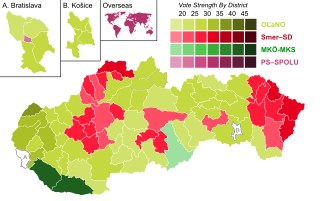
Parliamentary elections were held in Slovakia on 29 February 2020 to elect all 150 members of the National Council.

Progressive Slovakia is a liberal and social-liberal political party in Slovakia established in 2017. The party is led by Michal Šimečka, a former Vice President of the European Parliament. It is a member of the Renew Europe group and is a full member of the Alliance of Liberals and Democrats for Europe Party. PS currently has 6 MEPs: Ľudovít Ódor, Veronika Cifrová Ostrihoňová, Martin Hojsík, Michal Wiezik, Ľubica Karvašová, and Lucia Yar.
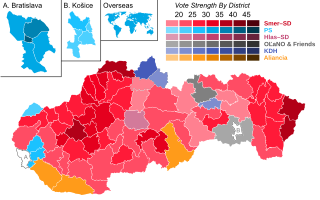
Early parliamentary elections were held in the Slovak Republic on 30 September 2023 to elect members of the National Council. Regular elections were scheduled to be held in 2024. However, on 15 December 2022 the government lost a no-confidence vote. Subsequently, the National Council amended the Constitution so that an early election could be held on 30 September 2023. This was the first snap election in the country since 2012.
















